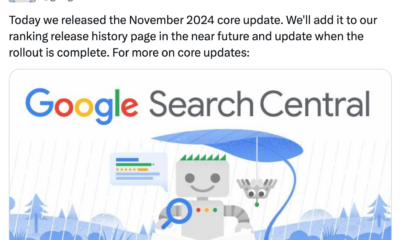SEO
A 7-Step SEO Process For Long-Term Search Success

It’s no secret that the adventure of SEO means being in it for the long game.
Optimization is a never-ending process.
One day, you’re ranking at the top of the search results – and the next, your competitor publishes something new that knocks you down a rung.
The promise of SEO can bring traffic, revenue, and growth to your business but many marketers give up right after they begin. They love the promise more than they love the process.
In fact, the process holds the key to realizing your end goal in SEO.
Understanding The SEO Process
SEO is like fitness.
In physical fitness, there are no shortcuts to game the system (i.e., your body) unless you’re OK with taking serious health risks.
You need to have a plan and stick to it. That means exercising, eating right, and pushing yourself to continuously improve naturally.
Similarly, in SEO, there’s no way to “game the algorithm” (e.g., Google) unless you expect to cut corners – something I don’t recommend.
So, I was quite surprised recently on a monthly call to learn that one of my large clients was impatient with the SEO process.
How does someone so successful – and one who typically follows a process for the promise of more clients and cases – not understand and love and respect the SEO process?
You can’t get to the promise without going through the process.
SEO (and most forms of digital marketing) is a process that, with patience and strategy, will bring you the promise of new traffic, leads, clients, revenue, and growth.
To understand the process you have to create a plan, have a strategy, and know all the steps in the process.
1. Audit
The Process
Our process always begins with a technical and/or a content audit.
Technical Audit
A technical audit looks at absolutely every element on the site that can impact your SEO performance.
One of the most important of all these elements is speed.
I’ve seen so many websites put a large video introduction on the homepage that takes far too long to load.
The result?
You have a high bounce rate and have lost a potential client or customer.
If only they did a smaller version of the video or moved more relevant content above the fold, their speed and conversions would be much better.
A technical audit should be in-depth and take weeks to complete, depending on what’s wrong with the site.
Content Audit
If you have a large website with thousands of pages of content, then it’s definitely worth doing a content audit.
A content audit will help you identify which pages are performing well and which ones are underperforming.
Then you can make decisions about which piece of content to keep, optimize or rewrite, or remove from your website altogether.
When you remove content from your website, you may see a drop in traffic – but that’s the point. You want to deter non-relevant traffic.
Non-relevant traffic (i.e., visitors who are not aligned with your target audience) is unlikely to convert into clients or customers. In that sense, that traffic doesn’t really benefit your business.
By auditing your content, you can “prune” out the content that’s driving non-relevant traffic and then focus on optimizing the content that’s likely to bring the best results for your business.
Then, once search engines index all this optimized, relevant content, you should begin to see more conversions.
The Promise
By going through the process of a technical audit, content audit, or both, you will have a complete understanding of everything that needs to be fixed in order to rank well in organic search.
SEO is a puzzle. Put the pieces together.
It is just the first step. But the first step can sometimes be the hardest.
Now it’s time to build upon that momentum.
2. Technical SEO
The Process
When it comes to technical SEO, there’s a lot to think about, including:
Improving your technical SEO requires a holistic approach; tackling just one item on this list won’t really move the needle. You need to consider everything if you want your website to perform.
I like to use the analogy of a house here:
A house needs a foundation, electrical, plumbing, walls, and a roof. If you don’t have all these things, you don’t have a house. You have a shell.
The same is true of technical SEO. You need to get all of these elements right to have an optimized website.
The Promise
By increasing the speed, functionality, and user experience (UX) of your website, you’re likely to see more conversions.
This is because users will find your website easier to navigate, read, and engage with.
After conducting a technical audit, you’ll have a list of technical blockers that may be hindering your site’s performance.
Optimize these, and you’ll make your website faster, crawlable, and in a better place to be indexed by search engines.
In fact, we recently made fixes to a site in the brewing industry.
After fixing all the errors, this company saw a 1,100% increase in traffic.
That’s the promise of technical SEO!
3. Keyword Research
The Process
Keyword research is an integral part of the SEO process.
Without keyword research, you’ll only be making guesses about how users are searching for your business, products, or services.
Keyword research tools reveal how many users are searching for a particular term, how difficult it is to rank for that term, and which related terms people are also using to find information online.
This process starts with thinking about the hypothetical terms your target audience may be using to find your business and then using SEO tools to either validate or refute your findings.
Researching your competitors’ sites is another good way to surface keyword opportunities.
Finally, keyword research helps you uncover geo-specific keywords to help you localize your SEO strategy.
I highly recommend reading Roger Montti’s excellent guide, How to Do Keyword Research for SEO: Everything You Need to Know.
The Promise
Keyword research helps you uncover which keywords are most valuable to you.
Optimizing your content around high-value keywords is what will get you in front of your potential clients or customers when they need you most.
If people can’t find you when they’re looking for a service or product you offer, then they can’t buy from you. It’s that simple.
4. Location Demographics
The Process
Whether you’re doing SEO for a local business or a client who offers a service in a specific region, you know the importance of location.
Much like buyer personas, you need to understand how people search for local businesses and service providers, and who they are.
That means you need to ensure you have accurate NAP (name/address/phone) information and content that references your service area, whether it’s a state, city, or neighborhood.
Claim and optimize your Google Business Profile listing.
The Promise
The goal of your website is to speak to your target audience. And when I say your “target audience,” I mean potential customers or clients.
Demographic research will reveal tons of helpful information about where your target audience is searching for goods, services, or information. You can then use this data to inform your targeted, localized SEO strategy.
Keep in mind that Google rewards websites based on factors such as relevance, distance, and prominence.
The promise of SEO in this phase is if you produce a website experience that’s relevant, localized, and authoritative, Google is more likely to rank your content and display it to your target audience.
5. Content Strategy
The Process
You need a content strategy. Here’s a proven strategy.
Foundational Content
This is your core content that targets your main keywords and topics. Create content that is about your services or products (your “money” keywords).
You can further enhance this content by writing about other relevant services and products you offer and any relevant long-tail keywords.
FAQ Content
Create pages that answer common questions your audience is likely asking using Google.
Make sure it has an SEO-friendly URL, you use breadcrumbs, and it is more comprehensive than any other page on the topic (make sure to check the competing pages in the top 10 positions).
Authoritative Content
Let your clients create content to demonstrate their expertise and authenticity.
User Experience
Think about ways to enhance your content (e.g., using visuals), your website navigation (e.g., linking to other relevant pages on your website), and calls to action (e.g., free consultation, make an appointment, content download).
The Promise
Creating content with a purpose will attract the people you want to become your customers or clients.
Make it easy for people to understand who you are, what you offer, and find exactly what they’re looking for.
You will be rewarded with more leads and conversions!
6. Content Writing & Editing
The Process
Your client may want to write their own content, or they may want you to do it.
Either way, the content needs to be optimized.
Always think about the audience or personas first, but without neglecting SEO best practices.
You want to write content that people will engage with and share (and that Google will index and reward with great rankings).
Ultimately, it’s about moving people toward a conversion.
If you haven’t already, make sure to read Ron Lieback’s 47 tips to master SEO writing.
The Promise
Content is essential when it comes to communicating your brand’s message to your target audience.
It also plays a significant role in SEO; if well optimized, your content can drive more organic traffic to your website.
Content also helps to demonstrate authority, relevance, and trust. Well-written, optimized, accurate, and authoritative content is the best way to do that.
Your content should not simply be a medium by which you shoehorn keywords into your website.
Instead, it should speak of the value your business provides, how users can engage with your business, and overall provide a positive experience for your prospective customers.
On the flip side, poorly written content will do the exact opposite – it will send users running to your competitors!
So, don’t treat content as an afterthought. Be sure to invest in high-quality, optimized content.
7. Ranking
The Process
OK, you can’t control Google or any search engine’s rankings.
However, you absolutely can understand how search algorithms work, which helps. But there are never guarantees.
That said, there is one process that can work.
Be excellent at all of the previous points we’ve discussed so far and you should see SEO success.
- Know your audience.
- Create great content for your audience.
- Provide a great website experience for your audience.
Is it easy? No.
But it works!
The Promise
If you do everything you possibly can to optimize your site and build your brand, and you offer a quality product or service, then it’s inevitable that you will be rewarded with the organic search visibility you deserve.
Conclusion
“Success is a journey, not a destination.”
This quote rings just as true for SEO as it does for life.
If you’re always looking at the end result, you’ll miss the adventure, learnings, and experience of the process.
Every successful SEO strategy starts with a plan. Then, it’s a matter of putting in the work for the long haul.
SEO is a marathon, not a sprint.
The only way to get to where you want to be is to develop and follow a process. This process can evolve over time, but a proper plan is way better than “winging it” when it comes to your SEO strategy.
Then, you can celebrate success at every milestone, improve your approach over time, and most of all, enjoy the process of SEO over your business’s lifetime.
More Resources:
Featured Image: ChooChin/Shutterstcok













You must be logged in to post a comment Login